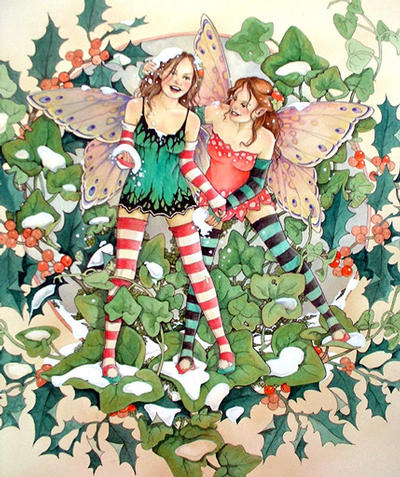 |
|
The Christmas season is a very special time for me, because as a child I never got to celebrate it. While growing up, I had always been envious of my next-door neighbor who got to observe Christmas. Being Jewish, I had my own holiday, Chanukah. But the Gentile holiday seemed so much bigger, so much better. I did not consider the meaning of either day, only the outward trappings by which my festivity did not measure up. My parents stressed that our celebration lasted eight days, while my friend had only one day. We lit candles and got presents nightly. Yet my family was poor, and our presents consisted of crayons and coloring books. There was a bigger present on the last day of Chanukah, but the other seven presents hardly counted. My neighbor, however, lived in a transformed house for what seemed like an entire month. There was tinsel and holly and an absolutely indescribable tree decorated with glowing balls and glittering ornaments. She hung a stocking by her fireplace on Christmas eve, and what she found in it the following morning made my paltry Chanukah collection fade into insignificance. Then there was Christmas morning itself. I could only dream of what unimaginable delights emerged from beneath that tree. All I knew for certain was that they were bigger than anything I got for Chanukah. It seemed a pale, dull life by comparison, to be a Jew. When I grew up and left home, I determined to celebrate Christmas. I had always wanted a Christmas tree, and I bathed in the luxury of decorating it. This I did, not according to any tradition, which my Jewish upbringing left me lacking, but according to the dictates of my then-hippie heart. Christmas became a joy, allowing me to express my artistic yearnings and fulfill my childhood fantasies. I loved it so much, in fact, I rarely took the tree down before Valentine’s Day! As Christmas grew in my esteem, Chanukah faded from importance. Yet neither holiday had spiritual significance for me; they were simply expressions of celebration, and Christmas seemed the more successful of the two. But when I accepted the Messiah into my life, everything, including my appreciation of the winter celebrations, was transformed. No more was Christmas merely an opportunity to decorate my house with aesthetic abandon. No longer meaningless works of art, the adornments now form an expression of my love for my Redeemer, whose birth this special day celebrates. Without His presence, my Christmas tree could just as easily have been a Chanukah bush, or even a winter solstice plant; with Him alive in my life, it is a living reminder that He walked the same earth I walk, experiencing the same daily joys and sorrows I experience, ministering in love to those around Him, and ultimately dying that I might live eternally with Him in glory. And what about Chanukah? Is it still a faded flower beside the vibrant green of the Christmas décor? Y’shua probably never celebrated Christmas. It is unlikely His followers even baked Him a birthday cake, although they may have thrown together some gefilte fish for the occasion. Given the ambiguity surrounding the date of His birth, December 25th probably meant little to Him. Yet Chanukah did hold deep meaning for Y’shua. He stood in the Temple and declared Himself the Light of the World, that same Temple the Maccabees had cleansed from pagan desecration nearly two centuries before and whose dedication with special oil was the basis for the Chanukah miracle. As a Jew, He undoubtedly knew and expounded on the miracle of the Chanukah lights, a foreshadowing of His own light which would enlighten the entire world, Jew and Gentile alike. Just as He declared Himself Lord of the Sabbath, so also must He have declared Himself Lord of Chanukah. Chanukah has thus taken on renewed, enlarged meaning for me. I derive joy from decorating my home for Christmas, but I derive equal joy in celebrating Chanukah, remembering what God has done for my people in ages past. Not only did He enable the Maccabees to triumph over their much stronger Greek-Syrian foes who sought to subjugate them, forbid their worship of God, and desecrate their holy places; He also sent His own Son into the world, a birth whose celebration is Christmas, to redeem His own Jewish people and the Gentile peoples as well from the burden of their sins. The Chanukah candles brighten my house with their physical light, and simultaneously brighten my heart with the spiritual truth of His presence. Is there a contest in my heart between the two days? Not any longer. Together they have been transformed into a physical expression of the love my Messiah has for me and for all mankind. It’s a transformation worth celebrating! |
 |
 |
|
This image is © copyright and may not be used without the artist's consent Background design by SilverBerch, copyright © 2002 |